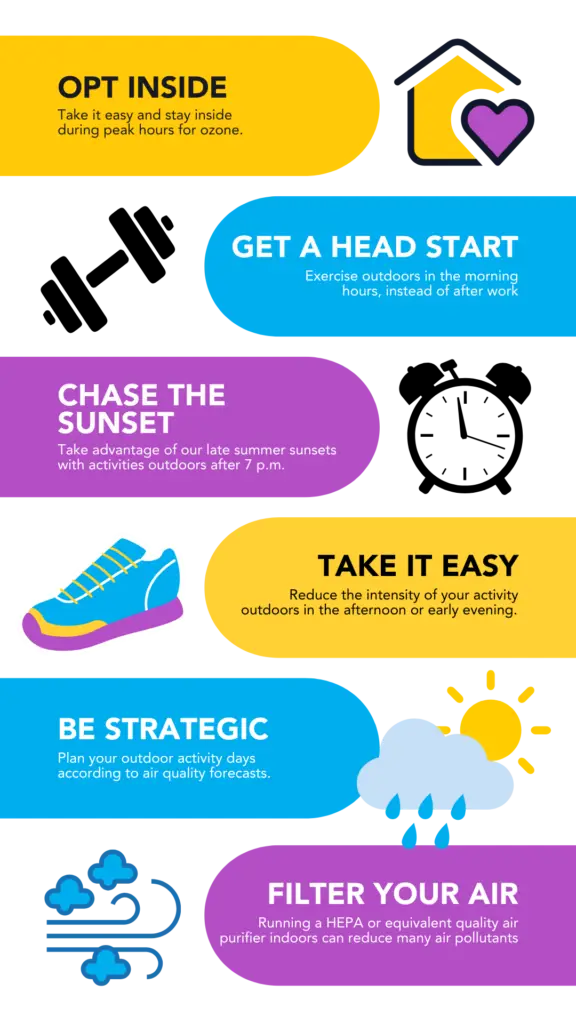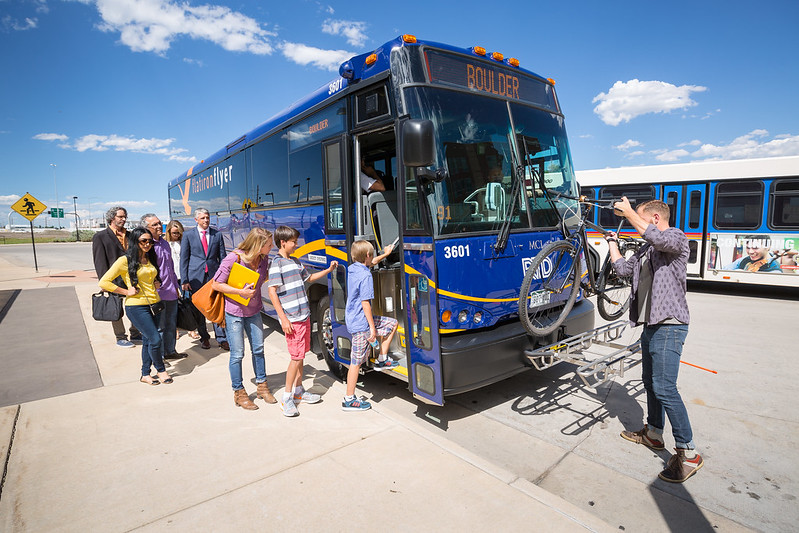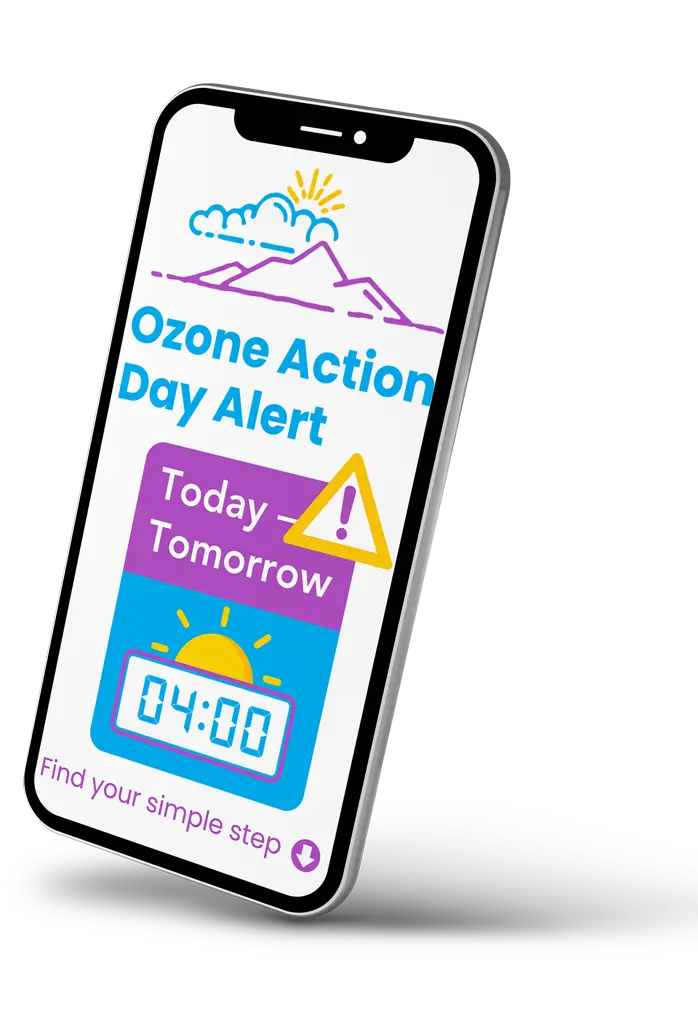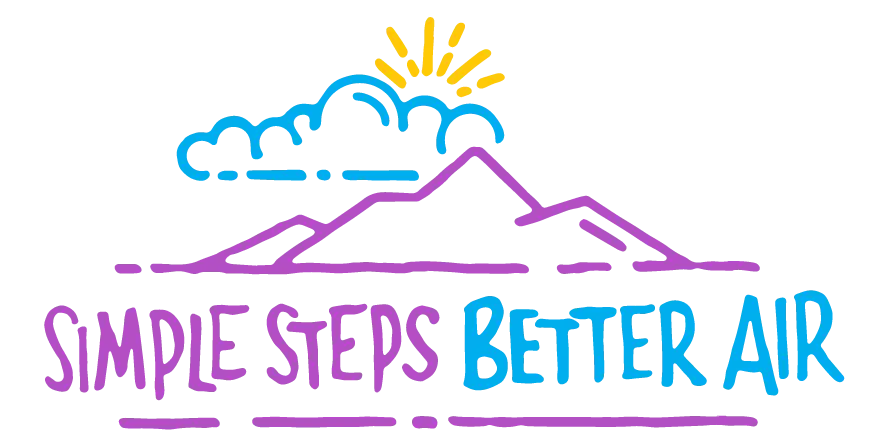Simple Steps
Want to make a difference for air quality and your health in the Colorado Front Range? Take some simple steps for better air!
These steps matter most on days with an Ozone Action Day Alert in June, July and August. However, all of these steps make a difference for air quality throughout the summer, and year round!
Learn which simple steps to take below…
Protect your health
When an Ozone Action Day Alert is issued, that means ground-level ozone concentrations are forecasted to reach levels “unhealthy for sensitive groups.” In this range, people with heart or lung health issues, older adults, children, people with diabetes, outdoor workers, and outdoor athletes are advised to reduce prolonged or heavy exertion outdoors if possible.
But ozone affects everyone! Regardless if you consider yourself part of these groups, it is a good idea to watch for coughing or shortness of breath on high ozone days, as that is a sign it could be affecting your health.
Ground-level ozone levels are usually highest between 12 p.m and 8 p.m. in the summer months. On action days, we recommend people take some of the following actions to reduce their exposure:

- Opt inside: Take it easy and stay inside during peak hours for ozone. Close the windows and run fans or the AC, if possible.
- Get a head start: Exercise outdoors in the morning hours, instead of after work or in the early evening.
- Chase the sunset: Take advantage of our late summer sunsets with activities outdoors after 7 or 8 p.m., when ozone levels decrease.
- Take it easy: Reduce the intensity of your activity outdoors in the afternoon or early evening.
- Be strategic: Plan your outdoor activity days according to air quality forecasts. Swap the bike ride or run for a session in the gym, pool, indoor climbing gym, or a yoga class.
- Filter your air: Dealing with allergies, odors, wildfire smoke, or an illness? Running a HEPA or equivalent quality air purifier indoors can reduce many air pollutants that cause breathing difficulties when ozone is higher, and reduce the spread of illness. Filters with activated carbon “pre-filters” help reduce smells and unhealthy gases indoors.
Reduce your emissions
Taking voluntary actions to reduce your emissions in the summer months – and especially on ozone action alert days – is a meaningful way to reduce ground-level ozone and improve our air quality in the Colorado Front Range.
Walk, bike, or scoot
For distances shorter than 2 miles, leave the car at home and walk, ride a bike or an e-bike, or use a scooter to get where you need to go!
Walking
Walking short distances is an easy way to get your steps for the day. Want to make the route a bit easier? If using Google Maps or a similar wayfinding app, choose the “wheelchair accessible” option in settings, to avoid stairs and prioritize elevators. Footpath Route Planner records your routes in the app, so you can easily repeat them in the future.
Biking
Biking is a fast and fun way to get around your neighborhood! Many bike lanes and routes are mapped out on various mobile apps, including Denver’s Bike Streets, Bikemap, Google Maps, and more. You can also integrate biking into a trip with public transit using the RTD app, bike racks on buses and on trains, and free bike storage along major transit routes.
Free bike repair stations are available along bike paths in various cities and counties, and Denver Public Library locations have basic tire repair equipment available to library card holders. Reduced cost bikes, bike maintenance, classes and other resources are available at various local bike shops and community groups, such as Bikes Together, Boulder Community Cycles, and Bicycle Colorado.
Looking to purchase an e-bike? Many discounts, tax credits, and rebates are available! In 2024, participating Colorado retailers can offer a $450 discount off a qualifying e-bike purchase at the point of sale. Click here for a list of current participating retailers.
Shared bikes are also available for rent in the Front Range from Lime, Bird, Boulder B-Cycle, and Spin in Fort Collins. Local bike shops also offer short-term rentals.
The Colorado Department of Transportation encourages all cyclists to wear helmets and safety gear, and helmets are required for all class 3 e-bike operators and passengers under 18. Bikes should not be ridden on sidewalks. Do not ride against traffic or the direction of a bike lane. After dark, a rear reflector or rear red light, and a white headlight, are required by law. Remember that you are not the only one using a path or a main road, always be aware of your surroundings. Communication between drivers and cyclists is important so make sure you know your hand signals. Bicyclists must yield to pedestrians.
Scooters
Electric scooters are a great way to get around the city! You can purchase and ride your own personal electric scooter, or rent a shared scooter from companies like Lime and Lyft across the Front Range, and Spin in Fort Collins. Discount programs are available for many shared scooters.
There are a couple basic rules that you’ll need to know when riding a scooter. A helmet is highly recommended for all riders, but in the state of Colorado, any scooter operator or passenger under age 18 is legally required to wear a helmet while in motion. All traffic laws, signs and signals apply to scooters. Electric scooters should not be ridden on sidewalks – they ride in the same lanes that bikes. Do not ride against traffic or the direction of a bike lane. While personal scooters are allowed on public transportation, electric share scooters – like Lime and Lyft – are not allowed on buses and trains.
Take Public Transportation

Leave the car at home, avoid sitting in traffic, and take the bus or train to work, to run errands, or attend events and appointments. Compared with driving alone, taking public transportation cuts carbon dioxide emissions almost in half, decreasing pollutants in the atmosphere and improving air quality!
The Colorado Front Range has multiple public transit choices. Find the right one for you!
- RTD (the Regional Transportation District) covers the greater Denver metro area, and includes buses, light-rail, and a commuter line. RTD’s Zero Fare for Youth program invites riders ages 19 and under to use RTD at no cost!
- Transfort is a free public transit option that services Fort Collins in Larimer County. Transfort offers FLEX, a route that connects riders with stops between Fort Collins, Loveland, Berthoud, Longmont, and Boulder, providing a convenient way to travel throughout the region.
- Greeley-Evans Transit (GET) is a public transportation system that covers the areas in and around Greeley and Evans in Weld County.
- Berthoud Area Transportation Service (BATS) is a public transportation service that covers the Berthoud area in northern Colorado, offering door-to-door service on weekdays.
- City of Loveland Transportation (COLT) is a limited transit option that serves Loveland, and connects with FLEX, Northern Colorado’s premier regional bus route, operated by Transfort.
- CDOT’s Bustang can get into the mountains and back in the summer without a car! You can even bring your bike, skateboard, or scooter with you. Rocky Mountain National Park, Fort Collins, Steamboat Springs, Telluride, Durango, Crested Butte, Breckenridge, and more are all just a stress-free bus ride away. Fares work differently than other transit options in the Front Range, so be sure to check out costs, routes, and schedules on their website. Discounts available for children, seniors, and people with disabilities.
Work from home
We encourage remote and hybrid work, as working from home at least one day each week is one of the easiest ways to improve our air quality. It cuts down on your commute, decreasing both traffic congestion and vehicle emissions!
Want to get out of the house? Working remotely and locally in a way that reduces or eliminates your commute – like working from your favorite nearby coffee shop – provides the same air quality benefits.
Don't idle the car when parked
In the hot summer months, it can be tempting to idle your car in parking lots, drive throughs, and pick up lines for the air conditioning. However, personal vehicles generate around 30 million tons of carbon dioxide every year just by idling! In the Denver Metro Area and Northern Front Range, idling vehicles generate an estimated 700 million pounds of greenhouse gas emissions.
Turning your car off and on again, when parked in parking lots and pick up lines, and avoiding drive throughs, can make a huge difference for summer air quality in our region!
Every minute that a car idles, it releases enough emissions to fill 150 balloons with harmful pollutants, including carbon monoxide, particulate matter, and compounds that form ground-level ozone. These idling pollutants aggravate asthma and allergies and can cause cardiovascular and respiratory diseases.
Want to learn more about how to reduce idling in your community? Visit EnginesOff.org
Carpool and combine trips
Getting together or going somewhere with family and friends? Consider carpooling! Not only does this help reduce traffic, it cuts down on air pollution, and allows you to spend more quality time with your friends, neighbors, and coworkers.
Need to run to the store? Adopt an “while I’m out” approach to efficiently combine car trips, and you can have a dramatic impact on our air. You could also pick one day each week to shop and run errands.
Shopping online? When you order delivery, ask for a bundled shipment to save trips. And in the summer, have deliveries sent after 5 p.m. when possible.
Upgrade your vehicle
There are three major ways that you can upgrade your car to improve air quality! You can switch to a high MPG vehicle, a hybrid, or go fully electric.
- High MPG – If you are not ready or able to switch to a plug-in hybrid or all-electric vehicle, switching to a higher mile-per-gallon vehicle is still a good choice. Traditional hybrid vehicles use features like regenerative braking to achieve phenomenal gas mileage, improving air quality and saving you money!
- Plug-in Electric Hybrid (PHEV) – Plug-in Electric Hybrids have both an electric motor and a gas engine. They generally have a shorter electric-only range, but as they also utilize a traditional gas engine for longer range, they have a similar or longer range than many gas or electric vehicles. That means you can run around town utilizing the emission-free electric motor, but still have the dependable range for trips to the mountains.
- Electric Vehicles (EVs) – Nearly every major car manufacturer now includes EV options. EVs have a large battery that you can charge at home, at the office, or at public chargers. Charging your car’s battery is generally much less expensive than filling a tank with gas, especially when you utilize slower chargers that charge while you sleep or work. Some of the less expensive EV models do still have a shorter range (around 150 miles), but newer models have ranges that equal or even exceed the range of a gas vehicle (300+ miles). Colorado is a leader in EV conversion and offers substantial rebates on new and used EVs. Other local or federal rebates may also be available. Talk to your favorite dealership and visit the Colorado Energy Office website to learn what rebates are available in your area!
Electrify your lawn and garden equipment
Using gas-powered lawn equipment creates a large amount of air pollution, water pollution, and noise pollution. It surprises many people to learn that running a gas-powered lawn mower for one hour generates the same emissions as driving a car 350 miles! And running a gas-powered leaf blower for one hour is the equivalent of driving a car over 1,000 miles!
Switching to electric lawn equipment eliminates polluting emissions, the need for fuel and maintenance, and the loud noises that negatively affect you and your neighbors. You’ll never need to run to the gas station just to get a gallon of gas again!
You can also get a huge discount when you upgrade: Thanks to a new law that went into effect on Jan. 1, 2024, Coloradans can save money and cut air pollution at the same time by enjoying a 30% discount on electric lawn mowers, leaf blowers, trimmers and snow blowers at participating retailers statewide! The Colorado Public Interest Research Group (CoPIRG) compiled a list of participating retailers. Please call a retailer in advance to confirm participation as companies may start or discontinue participation: https://pirg.org/colorado/foundation/resources/how-to-unlock-savings-with-colorados-new-electric-lawn-mower-tax-credit/
Are you a small business or a local government looking to electrify your equipment? The RAQC offers small business grants to help you purchase new electric mowers, line trimmers, and other equipment. The RAQC is also partnering with local governments in the Front Range for residential mower trade-in events, where you can bring in your old gas mower for a large discount on a new electric model. Learn more at MowDownPollution.org.
Mow and fill up after 5 p.m.
As ground-level ozone levels build up throughout the course of the day with heat and sunlight, reducing emissions before 5 p.m. is one way to help keep ozone from reaching unhealthy concentrations.
If you need to mow your lawn or conduct work using gas-powered equipment, try to do so in the evening hours, instead of the morning or during the day.
If you are still driving a gas-powered car, try to fill up with gas in the evening hours, instead of the morning or during the day. Stopping at the first click also reduces the amount of evaporative emissions that escape into the air and saves you money!
Regular Car Maintenance
Conducting regular car maintenance – such as keeping your tires properly inflated and receiving regular oil changes – helps keep your vehicle in good working order, allowing it to get the best gas mileage possible, and avoids the creation of unnecessary air pollution.
Need help repairing your car? CAAR (Clean Air Auto Repair) is a program run by the Regional Air Quality Council (RAQC) that aims to reduce air pollution by fixing high polluting vehicles, within the Denver metro and Colorado Front Range. Learn more and see if you qualify: www.cleanairautorepair.org.
Know when it matters most
When it comes to acting on air quality, some days are more important than others! Sign up for summer ozone alerts to know when it matters most to take simple steps for better air in your community. Our timely text and email alerts can also help you protect your health.

